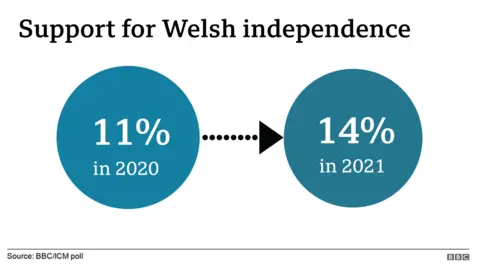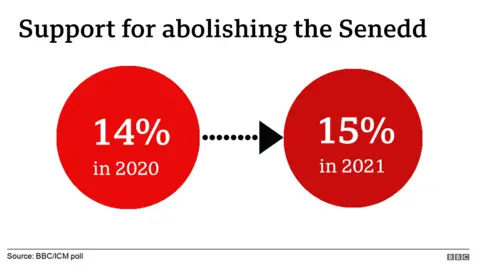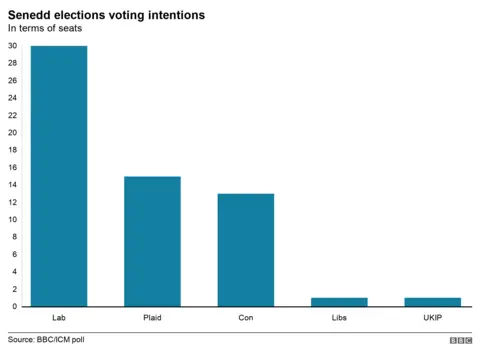Voting attitudes and Senedd powers quizzed in poll for BBC Wales
 Getty Images
Getty ImagesNew analysis suggests Labour is in a "strong position" to come first in the Senedd election, in light of the annual St David's Day poll for BBC Wales.
The poll suggests Labour will win 30 seats, Plaid Cymru 15, Conservatives 13 with the Liberal Democrats and UKIP picking up one seat each.
The research, by ICM Unlimited, also indicates increased support for Welsh independence.
It suggests backing for Wales leaving the UK is 14%, up from 11% last year.
Support for abolishing the Senedd shows a slight change compared to last year and stands at 15% - up one percentage point from 2020.


The ICM poll includes 16 and 17-year-olds in the sample, as they will have the right to vote in elections for the Welsh Parliament for the first time.
Voting intentions
In the Senedd election scheduled for May, on the constituency vote, Labour polled 39% in the survey - an increase of eight percentage points since last year and the party's highest rating since it scored 40% in February 2018.
The Conservatives' vote share has decreased since 2020 by seven points, going down from 31% to 24%.
This puts the Tories on level pegging with Plaid Cymru, whose poll rating has slipped two percentage points since this time last year.
Similarly, the Liberal Democrats have seen a slight decrease in their level of support, down to 4%.
On the regional ballot, Labour's share of the vote has increased by six percentage points to 37%, whilst the Conservatives and Plaid Cymru - both on 22% - have seen support fall by seven and three percentage points respectively in the last 12 months, according to this latest poll.
Support for UKIP has increased since last year to 4% and the Abolish the Welsh Assembly Party also scores 4% .
Prof Roger Awan-Scully, head of politics and international relations at Cardiff University, has made the following seat projections based on a uniform national swing since the 2016 election, to what was then known as the Welsh Assembly:


- Labour 30
- Plaid Cymru 15
- Conservatives 13
- Liberal Democrats 1
- UKIP 1
Commenting on the poll, Prof Awan-Scully said: "The new BBC/ICM poll suggests that Labour is in a strong position to, once again, come first in this year's Senedd election.
"Labour has won the most votes and most seats at all five previous devolved elections in Wales.
"And while many things about this year's election are likely to be very different, one continuity is that Labour is currently ahead of the field once again.
"The Conservatives and Plaid seem set for a close contest for second place, and both may be on course to increase their numbers in the Senedd."

"It is very possible, though, that the other parties who won seats in 2016 - UKIP and the Liberal Democrats - could be wiped out.
"Both are projected on this poll to narrowly hold onto a single seat.
"But it is far from certain that the UKIP brand will be the most appealing to any voters on the Euro- and devo-sceptic populist right, while the Lib Dems may struggle to hang onto their Brecon and Radnorshire seat with Kirsty Williams standing down as their candidate there."


It's a golden rule in Senedd elections that unless the opposition parties can take constituency seats from Labour then Labour will end up with somewhere around half the seats.
There simply aren't enough regional list seats to ensure a fully proportional result that might make a non-Labour led government a real possibility.
As has often been the case in Senedd elections, Plaid Cymru and the Conservatives are slugging it out for second place with neither looking poised to make a crucial breakthrough in the constituency section.
Senedd elections are won and lost by fine margins though and, unlike in Westminster elections, the results can vary enormously from one constituency to the next.
In short, while Labour will draw the most comfort from this poll both the Conservatives and Plaid will feel they have firm foundations to build on at the start of the election campaign, and all the parties know that any change in the perception of the Welsh Government's handling of the pandemic could lead a major shift in the public mood.
For the smaller parties - which these days includes the Liberal Democrats - there is no sign of the sort of upswing that saw UKIP grab a swag of seats five years ago.
Such swings often happen late in the day though, so the prospect shouldn't be written off entirely.

Independence
 Getty Images
Getty ImagesSupport for Welsh independence is the highest it has been in ten years of this survey, this latest poll suggests, with 14% saying they think "Wales should become independent, separate from the UK". That is up three points compared to 2020.
Despite the increase in support for independence, the most common response continues to be that the "Welsh Parliament should have more powers than it currently has", which is at 35%. However, this is down eight points from last year.
Support for abolishing the Welsh Parliament is up one percentage point from last year to 15%.
Prof Awan-Scully said: "This new poll confirms that there has been a rise in support for independence in Wales: from as low as 3% on this measure in 2014 to fourteen percent now.
"Yet while the growth in support for independence has attracted plenty of attention there is also a clear constituency of support in Wales for abolishing devolution altogether - and that option is supported by 15% of respondents in the new poll.
"Autonomy for Wales within the UK remains the clear majority preference in Wales, as it has been for at least two decades. But the consensus behind devolution is under increasingly vocal pressure from both ends of the spectrum."
Younger voters
This year's Senedd election will be different from previous ones in that 16 and 17-year-olds will be allowed to vote for the first time.
Prof Awan-Scully said: "Many people have asked me how much difference this could make - and generally seem rather disappointed with my answer, which is always 'not much'.
"The polling evidence does suggest that these voters lean more towards parties of the left - Labour and Plaid Cymru - than the Conservatives, just as other younger voters do.
"But there just aren't enough 16 and 17-year-olds for them, on likely turnout levels, to make a huge difference to the outcome of the election.
"Conceivably they might change the outcome in one or two very close seats - and if the election outcome overall is close, then that could ultimately make a difference. But that is not very likely."
ICM Unlimited interviewed a representative sample of 1,001 people aged 16+ by telephone on Jan 28-Feb 21 2021. Interviews were conducted across Wales and the results have been weighted to the profile of all Welsh adults. ICM is a member of the British Polling Council and abides by its rules.
